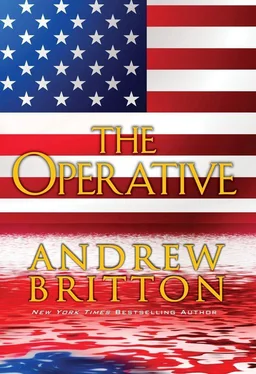Andrew Britton - The Operative
Здесь есть возможность читать онлайн «Andrew Britton - The Operative» весь текст электронной книги совершенно бесплатно (целиком полную версию без сокращений). В некоторых случаях можно слушать аудио, скачать через торрент в формате fb2 и присутствует краткое содержание. Жанр: Триллер, на английском языке. Описание произведения, (предисловие) а так же отзывы посетителей доступны на портале библиотеки ЛибКат.
- Название:The Operative
- Автор:
- Жанр:
- Год:неизвестен
- ISBN:нет данных
- Рейтинг книги:5 / 5. Голосов: 1
-
Избранное:Добавить в избранное
- Отзывы:
-
Ваша оценка:
- 100
- 1
- 2
- 3
- 4
- 5
The Operative: краткое содержание, описание и аннотация
Предлагаем к чтению аннотацию, описание, краткое содержание или предисловие (зависит от того, что написал сам автор книги «The Operative»). Если вы не нашли необходимую информацию о книге — напишите в комментариях, мы постараемся отыскать её.
The Operative — читать онлайн бесплатно полную книгу (весь текст) целиком
Ниже представлен текст книги, разбитый по страницам. Система сохранения места последней прочитанной страницы, позволяет с удобством читать онлайн бесплатно книгу «The Operative», без необходимости каждый раз заново искать на чём Вы остановились. Поставьте закладку, и сможете в любой момент перейти на страницу, на которой закончили чтение.
Интервал:
Закладка:
“We appreciate it.”
“Enough to let me stay parked here so I can just walk the stuff over?” the driver joked. “Those side streets are a bear.”
“Sorry,” Hemmings replied.
The officer leaned in and checked the marked contents against the bill of lading. The NYPD’s Counterterrorism Division was located in a secure block of office buildings, in a modern skyscraper. The bill of lading said the boxes were upgraded radiation detectors for the technology and construction section. That was the division responsible for the Lower Manhattan Security Initiative. Routes to the Wall Street area were already watched by streetlight-mounted boxes of technology designed to prevent even a well-shielded dirty bomb from being brought in. They were programmed to watch for radiation, as well, as the chemical signatures of containers in which radiological devices would be stored.
Everything looked to be in order. It was impossible to dismantle all the contents of every vehicle, but officers used the quick check-as well as common sense and profiling-to ascertain whether cargo represented a plausible threat.
The driver seemed relaxed. His accent seemed to fit where he said he was from. The van’s license checked out; the cargo looked right.
The vehicle was allowed to go on its way.
Contrary to his concerns, Absalom “Abbie” Bell found a parking spot on Exchange Plaza, a side street that bordered 55 Broadway, the police building. Two workers were sent down with dollies to accept the packages. A third came along to supervise. That left Bell with nothing to do. He offered to accompany his “copilot,” John Scroggins, on his delivery.
“Why don’t you get us some lunch instead?” Scroggins suggested.
“You ate in New Jersey.”
“And I intend to eat again when we get out of this maze. Might as well have some decent food, instead of rest-stop junk. All the Pennsylvania roadside is bad, and it only gets worse as we head west.”
Bell agreed that was a decent idea.
While Bell set out toward Broadway in search of something that didn’t sound like a chain, Scroggins took his own dolly from the forward section of the van and loaded it with a pair of crates that had been tucked beneath a canvas tarp. The other men were too busy to pay him any attention.
Scroggins easily off-loaded the crates one at a time, banded them to the dolly, and walked it west, to Trinity Place. It was amazing how the dolly seemed to have a will of its own due to the sloping, lopsided streets. They had seemed to the eye to be fairly level.
Just like people, he thought and chuckled to himself as he looked at the people heading to work. You never know what’s inside.
His eye caught the reflective glass of One World Trade to his right, the titan rising from the long-gone ruins of the World Trade Center. The tallest skyscraper in the hemisphere was a beautiful sight, its reflective glass skin aglow in the morning sun. He paused to take a cell phone picture. That site, too, seemed so level and firm. Looking at it, there was no way to know the trauma that probably still resonated in the granite below and the buildings all around it. Scroggins was looking forward to getting a better look at the site as they drove by on their way up the West Side as they started home. He only wished there were time to visit the memorial and museum. But staff drivers for Trask were constantly on the move, rarely having time to visit their families, let alone tour cities they visited.
He continued along Trinity to Battery Place and made a right. The wind from the harbor carried the smell of the Atlantic Ocean. He drew it deep into his lungs and smiled. You just didn’t get that in Atlanta or New Mexico or Chicago or Colorado or any of the other places they drove. In the park, to his left, was The Sphere, the large metal globe that once stood in the plaza between the World Trade Center towers. Though dented and torn, the Fritz Koenig sculpture was still readily identifiable. It choked Scroggins up to see it there, standing behind an eternal flame that had been lit on the first anniversary of the attacks, tourists pausing to pay their respects or marvel at something that had survived the destruction.
He continued west until he reached his destination. Arriving before the century-old white stone building, he stopped, pulled out his cell phone, and called a number he had been given.
“Dr. Gillani?”
“It is.”
“John Scroggins from Trask Industries,” he told her. “I have a pair of crates for you.”
“Thank you,” she said. “I will send someone.”
“Yes, ma’am. His name will be?”
“Excuse me?”
“For security. Who am I meeting?”
“Oh. Chuck Lancaster.”
“Thank you, ma’am.”
Scroggins folded away the phone and stood in the warm sunshine. It had been a long, nonstop drive, and as always, it felt good to have arrived. He felt as though he and Bell had earned their pay. Their coworkers at Trask did not refer to what he did as blue collar. So many of them were software geeks that they described his work as “analog labor.” He actually liked the sound of that. It was like LPs and movie film. He liked them, too. They were old but real.
He was thinking that thought just as his eyes wandered across the park to the harbor, where they settled on the Statue of Liberty. She had been whited out by the storm the last time they were here. It had been over twenty years since he’d seen the old analog girl.
“Nice to see you’re still here,” he said from the heart. He took another picture to show his wife. Eva had never been out of Georgia. If he was analog, she was just… log. Like a native who loved her ancient village and didn’t see any good reason to leave it. She said she was happy to live through him.
“Mr. Scroggins?”
The deliveryman turned as a burly man in a white lab coat came down the front steps.
“That’s me,” Scroggins said.
“I’m Chuck Lancaster,” the man said, flipping out a college ID.
“Yes, you are,” Scroggins said with a smile.
The young man showed him to the small service elevator just to the west of the door. They loaded the crates together.
“Not as heavy as they look,” Scroggins said.
The man in the white coat was silent. Years of sitting in a truck cab had made Scroggins comfortable with not talking. But that wasn’t the same as being antisocial. Scroggins believed in always making an effort.
“Some kind of equipment, but you’d never guess it,” the deliveryman said amiably. “Most of that stuff is transistorized and microchipped. Not like the brutes I used to handle for TI.”
“I’ll take it from here,” the big man said.
So that’s how it is gonna be, Scroggins thought. Okay. You tried.
“Great. All you need to do is sign, please.” Scroggins took an electronic device from a loop on his belt. He held it out.
The man looked down at the tiny screen. “What do I do?”
“Thumbprint anywhere on the monitor,” Scroggins said. “That way, if it doesn’t get where it’s supposed to, we know who to look for.”
He had said it as a joke, but he wasn’t kidding. The other man didn’t laugh. He just pressed his thumb to the screen, immediately heard a little chime, and stood next to a metal door, the service elevator access.
Ten minutes later, after Scroggins used his Minotaur phone to text his progress to dispatch-and received the go-ahead to proceed-he and Bell were back on the road, heading north past the World Trade Center site. Scroggins got only a glimpse as they swiftly headed uptown while the heavy commuter traffic crawled downtown to his left. The west side of the great tower, away from the sun, was comparatively dark and silent. It looked like a monument making the site seem mute and sacred. It choked him up, and he had to look away.
Читать дальшеИнтервал:
Закладка:
Похожие книги на «The Operative»
Представляем Вашему вниманию похожие книги на «The Operative» списком для выбора. Мы отобрали схожую по названию и смыслу литературу в надежде предоставить читателям больше вариантов отыскать новые, интересные, ещё непрочитанные произведения.
Обсуждение, отзывы о книге «The Operative» и просто собственные мнения читателей. Оставьте ваши комментарии, напишите, что Вы думаете о произведении, его смысле или главных героях. Укажите что конкретно понравилось, а что нет, и почему Вы так считаете.












